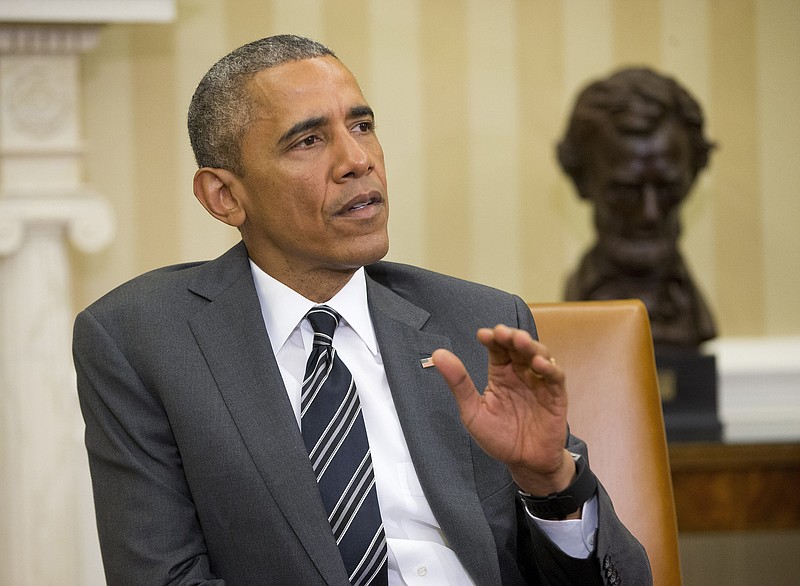WASHINGTON (AP) - Defense Secretary Ash Carter's blunt assessment that Iraqi forces lack the "will to fight" undermines a central premise of President Barack Obama's strategy for defeating the Islamic State: that Iraq's military can effectively handle ground operations so Americans don't have to.
Carter's comments in a weekend interview reflect deep concern within some quarters of the administration about the capabilities of Iraq's security forces. Despite outnumbering Islamic State forces, the military suffered a major defeat this month in the city of Ramadi. And some officials question whether it can overcome the same sectarian divisions between Sunnis and the Shiite-dominated government that gave the Islamic State space to thrive.
"The failure, it's not one of courage," Marina Ottaway, a Middle East analyst at the Wilson Center, said of the Iraqi military. "It's one of politics."
For now, Obama is showing no sign of significantly shifting his strategy or easing his opposition to sending American forces back into combat in Iraq. Instead, the White House is essentially pleading for patience and even more time to train Iraqis.
"That's a training process that can't be done in a week," White House spokesman Josh Earnest said Tuesday. "That's not a seven-day training course. This is going to require a more sustained commitment."
The U.S. already has spent years and billions of dollars trying to position the Iraqi military to take charge of the country's security. As the U.S. military withdrew from Iraq in 2011 after more than eight years of war, Obama declared that local forces were indeed ready to take on that mission.
With a fresh infusion of American trainers last year and a new Shiite government pledging to be more inclusive to Sunnis, Iraqi forces had made apparent progress against the Islamic State in recent months. But the rout in Ramadi, the strategically important capital of Anbar province, highlighted the military's weakness anew. Fleeing the city, Iraqi forces abandoned U.S military vehicles, including tanks, armored personnel carriers and artillery pieces.
"What apparently happened is the Iraqi forces just showed no will to fight," Carter said Sunday on CNN. "They were not outnumbered. In fact, they vastly outnumbered the opposing force. That says to me, and I think to most of us, that we have an issue with the will of the Iraqis to fight ISIL and defend themselves."
His comments echoed Joint Chiefs Chairman Gen. Martin Dempsey, who said the Iraqi security forces were "not driven out of Ramadi. They drove out of Ramadi."
Iraqi officials disputed Carter's characterization of the military's strength, saying he had received "incorrect information." Vice President Joe Biden called Prime Minister Haider al-Abadi in an apparent attempt to ease his concerns about the U.S. commitment to his security forces, while administration officials quietly tried to clarify the Pentagon chief's comments.
On Tuesday, the Iraqi government announced the start of a major military effort aiming to drive the Islamic State from western Anbar province. The operation involved Iranian-backed Shiite militias, sparking fears of potential sectarian violence in the Sunni heartland.
The White House has cast the loss of Ramadi as a setback but not a reason to revamp Obama's strategy. Since last summer, a U.S.-led coalition has been launching airstrikes against Islamic State targets in both Iraq and Syria. While more than 3,000 U.S. troops are in Iraq to advise and train the military, the president has insisted Americans will not be engaged in combat and will instead rely on local forces to carry out ground operations under cover of the airstrikes.
Obama's strategy reflects both his aversion to deploying American combat forces overseas again and his belief that the U.S. cannot fight a war on another country's behalf. Yet from the very start of the campaign to defeat the Islamic State group, there have been concerns both inside and outside the administration about the viability of relying on local forces.
In Syria, a country ravaged by civil war, such forces are virtually nonexistent. After months of delay, the U.S. began training about 90 rebels at a camp in Jordan, well short of the administration's goal of a 5,000-person force.
In Iraq, the U.S. is focused on bolstering the same military it sought to strengthen during the war pursued by Obama's predecessor, George W. Bush. Officials say the Iraqi forces were weakened after the U.S. withdrawal in 2011 in part because Sunnis didn't want to fight on behalf of then-Prime Minister Nouri al-Maliki's government.
Al-Abadi, who succeeded al-Maliki last year, has taken steps to better empower minority Iraqis and reduce their support for Sunni extremists, U.S. officials say. But al-Abadi's decision to include the Shiite militias in the campaign to retake Ramadi could exacerbate the very tensions he's been pressed by the U.S. to ease.
___
AP National Security writer Robert Burns contributed to this report.
___
Follow Pace at http://twitter.com/jpaceDC
